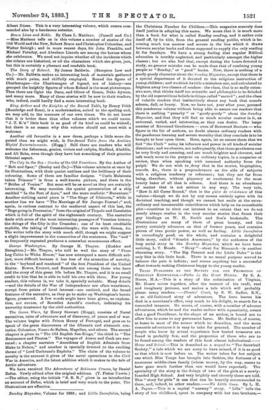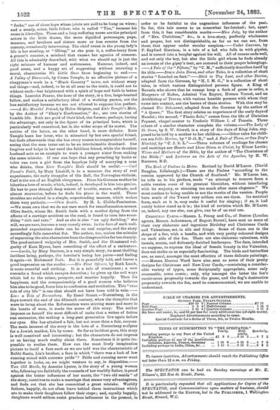TALES PUBLISHED BY THE SOCIETY FOE THE PROMOTION OF CHRISTIAN
KNOWLEDGE.—Paths in the Great Waters. By E. A.
Hoare, M.A.—This is a story of the colonisation of Virginia. Mr. Hoare mixes together, after the manner of his craft, real and imaginary persons, and makes a tale which will probably
please many readers.—Pirates' Creek, by S. W. Sadler, R.N., is an old-fashioned story of adventure. The hero leaves his
desk in a merchant's office, very much to his delight, to search for a concealed treasure. He meets, of course, with a number of adverse adventures, which he and the reader endure with equanimity, aware
that a good Providence, in the shape of an author, is bound not to allow him to come to any permanent harm. Mr. Sadler is, of course, at home in most of the scenes which he describes, and the more romantic adventures it is easy to take for granted. The number of people who know by actual experience how buried treasures aro found is probably few, and the proportion of them who are to be found among the readers of this book almost infinitesimal.— Home and School.—This is described as a sequel to "The Snowball Society," a tale which we are sorry to have missed, if it is as good as that which is now before us. The writer takes for her subject one which Miss Yonge has brought into fashion, the fortunes of a numerous middle-class family (whose money, by the way, seems to have gone much further than one would have expected). The speciality of the story is the doings of two of the girls at a newly. founded High School. And very brightly and cleverly these are told. This "story for girls" is one that can be heartily recommended to them, and, indeed, to other readers.—TVe Little Ones. By L. H. A. Payne.—This is a capital "nursery" story. "Lille" tells the story of her childhood, spent in company with her two brothers,—
"Jerks," one of those boys whose joints are said to be hang on wires ; and a steady, sober, little fellow, who is called "Tim," because his name is Llewellyn. These and a long-suffering nurse are the principal actors in the little drama, the more dignified personages, papa, mamma, and brothers and sisters more or less remote from the nursery, occasionally intervening. The chief event in the young lady's life is her stealing, or "lifting," as she puts it, a coffee-berry from a grocer's counter, a misdeed that causes her agonies of remorse. All this'is admirably described, with what we should say is just the right mixture of humour and seriousness. Humour, indeed, and good sense, and a happy art of suggesting without intruding a moral, characterise We Little Ones from beginning to end.— A Valley of Diamonds, by Crona Temple, is an effective picture of a clergyman's work in a "Black Country" town, not without many sad things—and, indeed, to be at all near to the truth, it could not be without such—bat brightened with a spirit of hope and faith in better things. Lancelot Pearse, the hero of the story, is a fine, large-hearted fellow, and makes a satisfactory ideal of a working parson, not the less satisfactory because we are not allowed to suppose him perfect. —A Six Months' Friend, by Helen Shipton, and Kate Temple's Mate, by the Author of " Clary's Confirmation," &c., are two stories of humble life. Both are good of their kind, the former, perhaps, having the advantage, not only in the figure of its principal hero, which is particularly well conceived, but in the wider scope of its moral. The motive of the latter, on the other hand, is more definite. Kate Temple loses her lover, who is attracted by her own special friend, but finds afterwards that she has every reason to congratulate herself, seeing that the man turns oat to be an irreclaimable drunkard. She forgives and helps in her need the faithless friend, while the drunken husband acts as an example to warn a younger sister from making the same mistake. If one can hope that any preaching by books or voice can turn a girl from the hopeless folly of marrying a man who drinks, then Kate Temple's Mate should be useful.—Carl Forest's Faith, by Mary Linskill, is in a measure the story of real experiences, the early struggles of Ole Bull, the Norwegian violinist. Carl is the son of an English clergyman. From his German mother be inherits a love of music, which, indeed, is developed in him into genius. He has to pass through deep waters of trouble, sorrow, solitude, and almost starvation, before he finds his idace in the world. These troubles are related in a simple, unpretending manner, which makes them very pathetic.-0/ite Smith. By H. L. Childe-Pemberton. —We must own that we do not care much for transformation-scenes. Olive Smith, whom Mr. Smith finds with a mother dying from the effects of a carriage accident on the road, is found to turn into some- thing "rich and rare." And as she is also "an ugly duckling," she will, we are sure, become a very comely swan. In the face of such well- grounded expectations there can be no real surprise, and the story accordingly falls somewhat flat. The author, too, makes the mistake of separating the nice characters from the disagreesbles far too sharply. The good-natured vulgarity of Mrs. Smith, and the ill-natured vul- garity of Kate Myers, have something of the effect of a caricature. —Lucile, by Mary Davison, is a very simple story, its most thrilling incident being, perhaps, the heroine's losing her purse—and finding it again—in Richmond Park. But it is gracefully told, and leaves a good impression on the reader.—His First Offence, by Ruth Lamb, is more eventful and striking. It is a tale of conscience ; a man commits a fraud which escapes detection ; he gives up the evil ways which led to the crime, prospers, and marries happily. Then his happiness, and the companionship of a good woman who believes him also to be good, force him to confession and restitution. This "true tale of city life" is one that should not have been told in vain.
Lia : a Tale of Nuremberg. By Esm6 Stuart.—Nuremberg, in the days toward the end of the fifteenth century, when the thoughts that were to bring about the Reformation were stirring more and more in the hearts of men, is made the scene of this story. The author imposes on herself the most difficult of tasks that a Writer of fiction can encounter, the making a long-past generation live again before our eyes. She has attained a fair, but not more than a fair, success. The main interest of the story is the love of a Nuremberg sculptor for a Jewish maiden, Lia by name. So far as incident goes, this story is well contrived and interesting ; but the characters do not impress us as having much reality about them. Sometimes it is quite im- possible to realise them. How can the most lively imagination picture to itself a face such as we are told was the characteristic of Rabbi Santa, Lia's brother, a face in which "there was a look of low canning mixed with extreme pride"? Pride and cunning never went together in looks, or, we might venture to say, in disposition.— Two Old Maids, by Annette Lyster, is the story of a young woman who, following too faithfully the counsels of her worldly father, is proof against the better influences of her aunts, the "two old maids" of the story, contrives to make a marriage that seems very advantageous, and finds out that she has committed a great mistake. Worldly fathers, happily, do not often leave behind them instructions which are to make their daughters follow their steps ; and, equally happily, daughters would seldom resist gracious influences in the present, in
order to be faithful to the ungracious influences of the past. So far, this tale seems to us somewhat far-fetched ; but, apart from this, it has considerable merits.—Miss July, by the author of "Mrs. Chrichton," &c., is a love-story, perfectly wholesome and proper, but not distinguishable, as far as we can see, from those that appear under secular auspices.—Under Canvass, by F. Bayford Harrison, is a tale of a lad who falls in with gipsieli, and is turned into a burglar against his will. All of course ends well, and not only the boy, but also the little girl whom he finds already an inmate of the gipsy's tent, are restored to their proper belongings. —A Tale of the "Fifteen," by "C. M.," sufficiently describes itself by its title.—Brace John Norse, and other Tales, is a collection of short stories "founded on fact."—Stick to Thy Last, and other Stories, adapted from the German, by "H. I. M. G.," is a collection of short tales, in which various distinguished persons figure. A King of Bavaria who shows that he cannqt keep a flock of geese in order, a Margrave of Baden, Admiral Von Ruyter, Horace Vernet, and an Archbishop of Treves, with various humble persons with whom they came into contact, are the heroes of these stories. With this may be classed The Rehearsal, adapted from the German by the author of "A Queen." The first story relates an experience of the early days of Handel ; the second, " Flauto Solo," comes from the life of Christian Pepaset, chapel-master to Frederic William I. of Prussia. Three others of a similar character complete the volume.—The Lady of St. Oaen, by S. W. Sitwell, is a story of the days of King John, sup- posed to be told by a mother to her children.—Other tales for child- ren are Felix Morton, by "D .G. B.," and A Pair of Them, or One Day's Mischief, by "C. J. S. L."—Three volumes of readings for classes and meetings are Hearts and Lives Given to Christ, by Elinor Lewis ; Wives and Mothers of the Bible, by the author of "The Choristers of the Bible ;" and Lectures on the Acts of the Apostles, by H. W. Burrows, B.D.







































 Previous page
Previous page